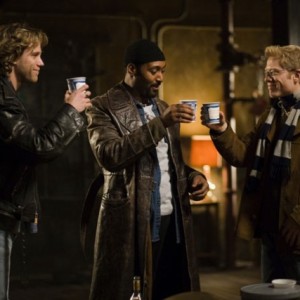‘Rent’, Don’t Buy

My main thought while sitting in a movie theater waiting for the film, Rent, to begin, was that I was happy that Hollywood is once again producing movies based on hit musical plays. Thanks to the success of the movie version of Chicago the energy of creation is again flowing from the stage to the screen instead of the reverse. I’m not sure why Hollywood stopped making musicals based on plays, unless the concept of a filmed version of Cats was simply too much for the Universe to allow.
That said, maybe the film version of Rent that I was supposed to find it inspiring…but I didn’t.
The fault lies not with director Chris Columbus, who surprisingly does a wonderful job of realizing the material. His previous work in the first two Home Alone films, Mrs. Doubtfire, and two Harry Potter treatments did not prepare me for his adept handling of adult material or his excellent use of Manhattan (real and simulated) locations to open up the play.
My problem is with the written material. The heroes of Rent are bohemian artists living in condemned buildings in lower Manhattan. The idea that they should pay rent in exchange for having a roof over their heads is an anathema to them. They want to suffer for their art, but they don’t want to suffer too much. Their motto is “No day but today;” maybe that inability to plan for the future explains why four of the main characters are HIV positive.
Anthony Rapp recreates his stage performance as Mark, the sort-of leader of the artistes who is a brilliant filmmaker, although his brilliance appears to come from his uncanny ability to point his camera in the general direction of where things are happening. I’ve seen home movies with better composition than his professional efforts at filmmaking.
Things happen for no apparent reason. One member of the group (Taye Diggs, seriously underused here) has married well and now owns the buildings everyone else lives in (or, more accurately, illegally squats in). At first he evicts them and takes all their stuff, then later he gives them their stuff back and offers to let them stay rent-free. Why? Who knows? A performance artist named, Maureen (Idina Menzel) is supposedly impoverished, yet she is able to stage a one-woman show which features multiple video screens, video tape effects, and all sorts of electronic equipment (need I point out that Maureen appears to be as talented at performance art as Mark is at directing?).
The decision to mainly use the original Broadway cast was laudable, but it’s now over a decade since the show debuted and most look a little long in the tooth to be innocent, idealistic college-aged bohemians. Jesse L. Martin, now well known from his stint on Law & Order, is excellent, but I swear there was some gray in his beard. One new cast addition is Rosario Dawson as Mimi, the drug-addicted exotic dancer that musician Roger (Adam Pascal) falls for because . . . because she’s . . . did I mention she’s an exotic dancer?
Rent is well directed, well acted, and contains enough imagination and energy to make the transition from stage to film. It just never transcends its material as Chicago did. But who knows–maybe some clever Broadway producer will make a musical out of the movie. demonstrates the problem with adapting a stage musical to the screen; characters and actions that seem fully realized and inspiring when seen on stage may appear pale and clichéd on a two dimensional screen. I could tell from the energy that went into creating the movie version of.